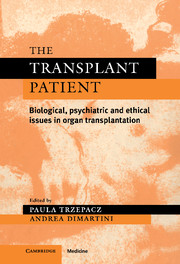Book contents
- Frontmatter
- Contents
- List of contributors
- Preface
- 1 The mystique of transplantation: biologic and psychiatric considerations
- 2 Psychosocial screening and selection of candidates for organ transplantation
- 3 Psychosocial issues in living organ donation
- 4 Quality of life in organ transplantation: effects on adult recipients and their families
- 5 Quality of life of geriatric patients following transplantation: short- and long-term outcomes
- 6 Cognitive assessment in organ transplantation
- 7 Pharmacologic issues in organ transplantation: psychopharmacology and neuropsychiatric medication side effects
- 8 Alcoholism and organ transplantation
- 9 Ethics and images in organ transplantation
- 10 Psychoneuroimmunology and organ transplantation: theory and practice
- 11 Pediatric transplantation
- 12 Current trends and new developments in transplantation
- Index
9 - Ethics and images in organ transplantation
Published online by Cambridge University Press: 14 September 2009
- Frontmatter
- Contents
- List of contributors
- Preface
- 1 The mystique of transplantation: biologic and psychiatric considerations
- 2 Psychosocial screening and selection of candidates for organ transplantation
- 3 Psychosocial issues in living organ donation
- 4 Quality of life in organ transplantation: effects on adult recipients and their families
- 5 Quality of life of geriatric patients following transplantation: short- and long-term outcomes
- 6 Cognitive assessment in organ transplantation
- 7 Pharmacologic issues in organ transplantation: psychopharmacology and neuropsychiatric medication side effects
- 8 Alcoholism and organ transplantation
- 9 Ethics and images in organ transplantation
- 10 Psychoneuroimmunology and organ transplantation: theory and practice
- 11 Pediatric transplantation
- 12 Current trends and new developments in transplantation
- Index
Summary
Introduction
The ethical issues associated with organ transplantation encompass some of the most basic features of our moral belief systems about human beings as embodied individuals. Here we find a deeply challenging mixture of images and arguments that concern life, death, and what is essential to being an intact human being. On the face of it, the issues seem clear, one person donating tissue or an organ that they are willing to give or can no longer benefit from to another person who needs that organ to live. But this is only the beginning of the discussion because of the inevitable mixed feelings that arise in relation to body parts from one person being used in another. Consider, for example, the problem of a heart transplant from a beating heart donor: if the heart is still beating and the donor is still breathing, then in what sense is the donor dead? This question has provoked one commentator to argue “that the heartbeat ‘counts for life’” (Evans 1990). It has also led some to a vigorous contemporary debate on strategies for obtaining organs for transplantation (Price 1996). The exact nature of human death and what defines life are among a number of questions that must be addressed in discussing these issues. These questions include:
Are there individuals who should be treated as freely accessible sources for organs and tissues for transplantation, such as fetuses and anencephalic infants?
If you are alive and could give a kidney to save somebody else's life, then you also decide to donate your heart to your child?
[…]
- Type
- Chapter
- Information
- The Transplant PatientBiological, Psychiatric and Ethical Issues in Organ Transplantation, pp. 239 - 254Publisher: Cambridge University PressPrint publication year: 2000
- 2
- Cited by



